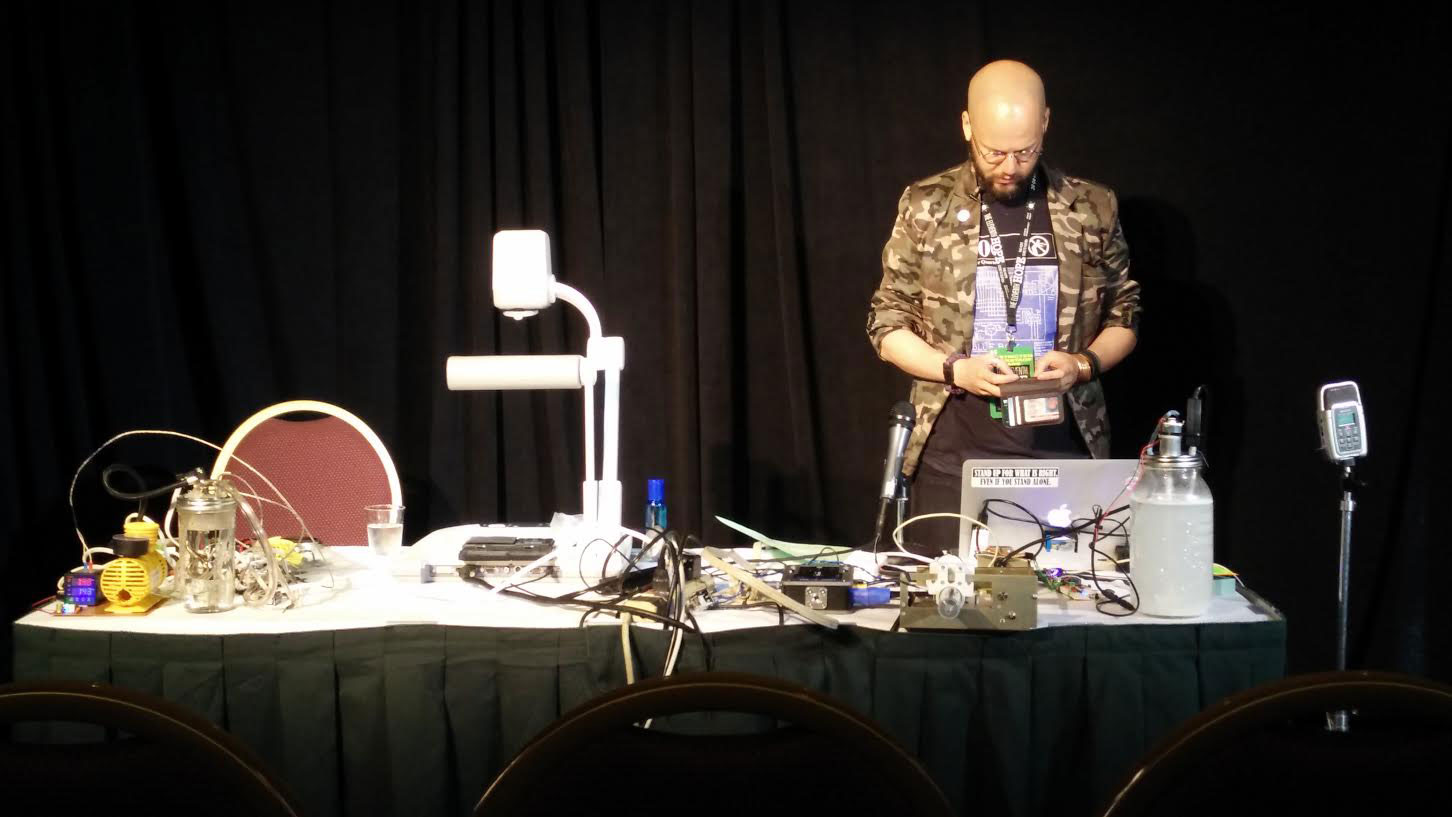Hacker Wants You to Make Your Own Drugs at Home
Cheap chemical equipment may let you make your own medical drugs, circumventing the pharmaceutical industry, one hacker says.
NEW YORK — You may soon be able to make and use your own drugs at home, circumventing the pharmaceutical industry, a chemical hacker said today (July 22) at the HOPE XI hacker conference here.

Dr. Michael Laufer, whose doctorate is in mathematics, not medicine, showed how an inexpensive microcomputer hooked up to a easily built chemical apparatus could be used to synthesize medical drugs that ordinarily costs hundreds or thousands of dollars per dose.
"We want people to have drugs they need whenever they need them, whenever they need them," Laufer said, "without going broke or dealing with an infrastructure that doesn't care whether they live or die."
MORE: How the Internet of Things Could Kill You
Laufer cited several drugs that save lives, but are prohibitively expensive or otherwise hard to obtain. They included Sovaldi, a drug that can cure hepatitis C, yet costs $1,000 per pill; Naloxone, which quickly reverses opiate overdose, yet is generally accessible only to police departments and hospitals; the "morning-after" pill RU-486, which induces spontaneous abortion; and GSK 744, an experimental drug still in trials that promises to not only replace current complex HIV-treatment regimens, but vaccinate uninfected individuals against HIV itself.
Most familiar perhaps is Daraprim, otherwise known as pyrimethamine, an antimalarial drug that is highly effective against toxoplasmosis, a neurological disease caused by a single-celled organism found in cat feces.
Last year, the price of Daraprim was increased from $13 a pill to $750 a pill by its sole U.S. manufacturer Turing Pharmaceuticals, despite the fact that the patent expired decades ago. As a result, Turing's young and brash owner, Martin Shkreli, became a tabloid villain.
Get instant access to breaking news, the hottest reviews, great deals and helpful tips.
All these drugs can be created inexpensively at home by untrained individuals using specially created automated chemical mixing devices, Laufer said. Doing so, he added, would help save the lives of people who could not otherwise afford or obtain the drugs.
(We at Tom's Guide don't endorse this practice, and we should note that certain hard-to-access drugs can be obtained in other ways. Daraprim, for example, can be bought online from Canadian pharmacies for between $1 and $2 a pill.)
Automated drug synthesis has been done for many years using controlled lab reactors, Laufer said. Those are computer-controlled chemical-mixing devices that also regulate temperature and pressure, taking over much of the time-consuming chemical drudge work that humans once had to do.
"Some of these are so sophisticated that you just load the ingredients, then stick in USB key and go home," Laufer said. "The problem is that they're horribly expensive and only sold to top-end labs."
Better living through chemistry
So Laufer has been building cheap equivalents of controlled lab reactors, which he refers to online as, collectively, the Apothecary Microlab. At the HOPE presentation, Laufer had a few large jars with tubes poking through the lids.
Photographs showed another jar with an electric tea warmer to keep the temperature constant, a valve from a bicycle tire to keep pressure constant, and silicone sealant to keep the holes in the lid watertight.
"It's pretty simple, but it works," Laufer said. "I was able to make aspirin, which is bacially a 'shake and bake' reaction, with it."
Another chemical-mixing apparatus Laufer showed in a photograph was an automated injector made from 3D-printed parts and a syringe used to feed baby calves. Such devices are hooked up to an Arduino microcomputer placed on a breadboard, or electronics-development base, along with relays that controlled the individual apparatuses on Laufer's DIY controlled lab reactor.
Laufer told the audience that he had synthesized Daraprim himself, and brought a sample of the drug to the presentation. He scooped 300 milligrams of the white powder into a capsule, then tossed it into the crowd, followed by other Daraprim capsules he had prefilled.
"If a seventy-five-milligram dose of Daraprim sold by Martin Shkreli is $750," Laufer said, "then I've just created a $3,000 pill for 25 cents."
Laufer told the audience that you shouldn't take Daraprim unless you're actually sick. It can have unpleasant side effects, including nausea and vomiting. And those side effects were Shkreli's justification for hiking the price of the drug, Laufer said, as the revenue would fund research and development into safer anti-protozoal drugs.
Asked whether his Apothecary Lab was safe to use, Laufer said he had partnered with Chematica, a project sometimes called the "Google of chemistry."
"It will comb through last several hundred years of chemical journals to look for anything remotely looking like the reaction you're searching for," Laufer said, "and it will put it all together for you."
Laufer said the Chematica recipes he'd devised for drugs such as Daraprim left room for large margins of error, so that users would not accidentally make toxic substances, or even geometrically different variants of the desired drugs.
Reaching out
Laufer noted that Shkreli had invited others to take part in the research and development. So in a funny but effective stunt, Laufer called Shkreli's private telephone number on speakerphone as the audience listened in. The call went to voicemail, with Shkreli's recorded voice identifying himself, but Laufer left a message.
However, Laufer said that he needed more participants for his Apothecary Microlab. "I'm here because we need more people," he said. "This works, but it only sort of works. To say that this is a beta unit is being very generous. It's more of an alpha plus. We need help. We need you."

Paul Wagenseil is a senior editor at Tom's Guide focused on security and privacy. He has also been a dishwasher, fry cook, long-haul driver, code monkey and video editor. He's been rooting around in the information-security space for more than 15 years at FoxNews.com, SecurityNewsDaily, TechNewsDaily and Tom's Guide, has presented talks at the ShmooCon, DerbyCon and BSides Las Vegas hacker conferences, shown up in random TV news spots and even moderated a panel discussion at the CEDIA home-technology conference. You can follow his rants on Twitter at @snd_wagenseil.
-
Ralston18 Dying also circumvents the pharmaceutical industry.....Reply
And I think I can expect a "thou shalt not" update to my life insurance policy.
